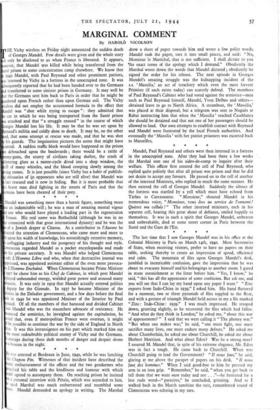e was arrested at Bordeaux in June, 1940, while he
was lunching the Chapon Fin. Witnesses of that incident have described the erne embarrassment of the officer and the two gendarmes who roached his table and the kindliness and humour with which ldel agreed to accompany them. On reaching prison he insisted a personal interview with Petain, which was accorded to him. aged Marshal was much embarrassed and mumbled some uses, Mandel demanded an apology in writing. The Marshal
drew a sheet of paper towards him and wrote a few polite words. Mandel took the paper, tore it into small pieces, and said: " No, Monsieur le Marechal, that is not sufficient. I shall dictate to you the exact terms of the apology which I demand." Obediently the Marshal wrote down the words that Mandel dictated ; obediently he signed the order for his release. The next episode in Georges Mandel's amazing struggle was the kidnapping incident of the s.s. Massilia,' an act of treachery which even the most fervent Petiniste (if such exists today) can scarcely defend. The members of Paul Reynaud's Cabinet who had voted against the armistice—men such as Paul Reynaud himself, Mandel, Yvon Delbos and others— obtained leave to go to North Africa. A steamboat, the Massilia,' was placed at their disposal, but a telegram was sent to Nogues at Rabat instructing him that when the Massilia ' reached Casablanca she should be detained and that not one of her passengers should be allowed to land. Our own attempts to establish contact with Reynaud and Mandel were frustrated by the local French authorities. And eventually the Massilia ' with her patriot prisoners was escorted back to Marseilles.






















 Previous page
Previous page